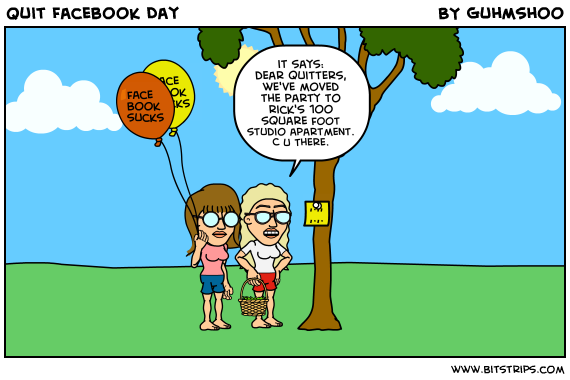Facebook 'Quitters': The kids who cried wolf?

Over the course of the last several weeks, several outraged Facebook users have taken to the web with declarations of quitting the service and trying to find another home. Some of them have even taken to the Facebook site itself to try and lobby for such a service (irony). The challenge, however, is that Facebook has become so ubiquitous -- so much that brands are using Facebook vanity URLs versus corporate sites in ads -- that there's nowhere else for these people to go without losing the networks they have built. At the same time, if they were really so outraged, wouldn't they just leave anyway? Apparently, it's not so easy for these screamers to put their actions where their mouths are.
I brought all of this up because today is apparently "Quit Facebook Day". If you haven't heard about it it's likely because no one you know is doing it. According to the web site aptly named "Quit Facebook Day," more than 31,000 people have pledged to quit Facebook today. That seems merely a blip compared to the amount of rage that has swept the web since the last explosion over Facebook's privacy tactics. More so, that's only about 0.07 percent of the social network's 400+ million users. Of course, many revolutions do start small, and only the data will tell at the end of the day whether or not people actually quit. Yet even many of the comments on the Quit Facebook Day site say things like, "I would quit but my friends and family use it" or "I won't quit, but sure this is a great idea."
So, what is the point of all of these people crying wolf?
In a press conference last week, Facebook CEO Mark Zuckerberg talked about how the company's leadership is indeed listening to its users about their apparent dissatisfaction. Granted, the company had little choice but to listen due to the international media attention it was getting and the poorly handled public relations nightmare that ensued, but Facebook quickly came forth with some changes that simplified the privacy administration for those who were finding it to be too difficult or confusing. Zuckerberg also discussed how the company tracks users' reasons for leaving the site when they do, and claimed that privacy has rarely been at the top of the list. Not to mention, the site has continued to grow through all of the hoopla. Granted, there are many more fixes that Facebook needs to make, and the site is still questionable in its practices, but this "boycott" approach may be futile.
Does this mean that Facebook is indeed akin to Google, a goliath force that we can't live without, even if we're terrified of what it might do with our information? Or does this mean that not as many people are as willing to vote with their feet and move away from Facebook for fear of losing their networks? How powerful is social presence, anyway?
The "Quit Facebook Day" threat reminds me of a "TwitOut" that was scheduled just over two years ago in response to Twitter's then unreliable servers. A group of people tired of unreliability -- who also happened to be big fans of FriendFeed -- picked a date and asked their networks to tell Twitter that they weren't going to take it anymore and were taking their "business" elsewhere. Well, I thought that was kind of preposterous, and I even created a mockery at the same time called Twitter Love Day, and all in all the TwitOut was kind of a failure. Yes, it did give more visibility to the great service of FriendFeed, which unfortunately never came into the mainstream limelight before it was acquired by Facebook. But it was merely months after the TwitOut that Twitter really started to garner national attention from the media and from celebrity users who brought with them their legions of fans.
So, what is the point of all of this noise? I remember a lesson I learned in my early 20s. Usually, if people merely threaten to stop doing something, it means they really don't want to stop doing it. Those who are serious about a boycott will just boycott, and then try to bring others to follow them. By all means, if someone is not happy with Facebook's practices, he or she should delete or lock down their profiles. Yet many who are leading these boycotts never take the first steps themselves. And some threatening to leave Facebook for fear of lack of privacy are the same ones happily chatting on public Twitter feeds. Hypocrisy aside, rather than throw an online tantrum, why not organize people for positive change? Create a lobby for better privacy requirements for social networks across the board. Help educate readers and followers on ways that they can better protect themselves. But stop the whining. Unless your goal is to eventually get your network to leave you, there has to be a more positive way to impact change.
Image courtesy of Newsvetter's The Guhmshoo Gallery
